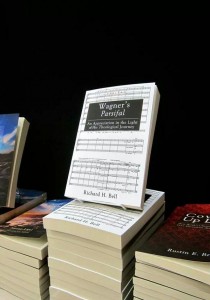Now available in the Veritas [1] series, and also now available at the book stall at the AAR/SBL:
 Gift and the Unity of Being, by Antonio López, with a foreword by John Milbank (Wipf & Stock, 2013, 368pp).
Gift and the Unity of Being, by Antonio López, with a foreword by John Milbank (Wipf & Stock, 2013, 368pp).
[Purchase now from Wipf & Stock [2] | Pre-order Amazon.com [3] | Pre-order Amazon.co.uk [4]]
Publication description:
Starting from both our originary experience of being given to ourselves and Jesus Christ’s archetypal self-donation, Gift and the Unity of Being elucidates the sense in which gift is the form of being’s unity, while unity itself constitutes the permanence of the gift of being. In dialogue with ancient and modern philosophers and theologians, López offers a synthetic, rather than systematic, account of the unity proper to being, the human person, God, and the relations among them. The book shows how contemplation of the triune God of Love through Jesus Christ in the Holy Spirit allows us to discover the eternal communion that being is and to which finite being is called. It also illustrates the sense in which God’s gratuitousness unexpectedly offers the human person the possibility to recognize and embrace his origin and destiny, and thus he is given to see and taste in God’s light the ever-fruitful, dramatic, and mysterious positivity of being.
Blurbs:
“I believed I was simply opening a brilliant, but also a routine comment on Giussani’s thought. But what I discovered here was a masterpiece! This book is no more than one of the most complete expressions of the . . . paradigm of ‘gift’ in present Catholic thought, embracing the neglected polarity of gift and to-be-given.” —Emmanuel Tourpe, Institut d’Etudes Théologiques
“Gift and the Unity of Being ranks among one of the most impressive reflections on the nature of gift, ranging from deep reflection on the nature of birth to the Trinitarian God as the agapeic giver of all that is. It importantly stresses the reciprocity of giving and receiving, with due deference for the disproportion and asymmetry of the divine superiority. This book accomplishes this in both philosophical and theological registers, drawing especially on the work of Luigi Giussani.” —William Desmond, Villanova University
“In this wonderful book Antonio López offers a profound metaphysical interpretation of the gift of existence that is at once rigorous, systematic, and systemically dialogical. López engages all the contending views of the gift out there, and especially those of Derrida, Marion, Milbank, and Guissani, [and] he offers his own alternative, which is embedded in the tradition of Aquinas and his theological and philosophical precursors and heirs. . . . A true tour de force!” —Cyril O’Regan, University of Notre Dame
Also now available:
 [5]Wagner’s Parsifal: An Appreciation in the Light of His Theological Journey, by Richard H. Bell (Wipf & Stock, 2013, 400pp).
[5]Wagner’s Parsifal: An Appreciation in the Light of His Theological Journey, by Richard H. Bell (Wipf & Stock, 2013, 400pp).
[Purchase now from Wipf & Stock [6] | Order from Amazon.com [7] | Order from Amazon.co.uk [8]]
Publication description:
Parsifal, Wagner’s final opera, is considered by many to be one of the greatest religious musical works ever composed; but it is also one of the most difficult to understand and many have questioned whether it can be considered a “Christian” work at all. Added to this is the furious debate that has surrounded the composer as an anti-Semite, racist, and inspiration for Hitler. Richard Bell addresses such issues and argues that despite any personal failings Wagner makes a fundamental theological contribution through his many writings and ultimately in Parsifal which, he argues, preaches Christ crucified in a way that can never be captured by words alone. He argues that Wagner offers a vision of the divine and a “theology of Good Friday” that can both function as profound therapy and address current theological controversies.
Blurbs:
“It is impossible to overstate the profundity, insight, and illumination of this extraordinary study. Richard Bell combines his detailed knowledge of Wagner’s music and writings with his professional expertise as theologian to offer a series of theological reflections on the composer’s last masterpiece, culminating in a view of its revelatory nature. The book represents a major contribution to Wagner studies and is simply a must for all lovers of the composer.” —Robert Pascall, Honorary Professor of Music Philology, University of Cambridge
“Richard Bell has done Wagner scholarship an enduring service. Wagner’s theology is an aspect of the composer’s intellectual universe that is seldom even acknowledged, let alone researched or understood; yet as Professor Bell demonstrates beyond any doubt, it is crucial to an understanding of Parsifal. . . . Bell is an eloquent and sure-footed guide through the labyrinth of theological and philosophical discourses that nourished Wagner’s final opera.” —Roger Allen, Fellow and Tutor in Music and Dean of St Peter’s College, Oxford
“Whoever may be interested in Richard Wagner’s music will appreciate this book, full of biographical, historical, philosophical, and musicological background information on the origins of his final stage work, Parsifal. But for a theologian interested in Wagner . . . this book can be an eye-opener. It demonstrates convincingly how many of Wagner’s literary motifs and musical/dramatic ideas have been deeply rooted in biblical tradition and Christian faith.” —Karl-Wilhelm Niebuhr, Professor for New Testament Studies, University of Jena, Germany
